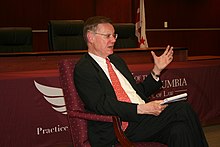Stephen Bright
Stephen Bright | |
|---|---|
 Bright lectures at the David A. Clarke School of Law in November 2017 | |
| Personal details | |
| Born | 1948 (age 76–77) Boyle County, Kentucky, U.S. |
| Alma mater | University of Kentucky |
Stephen B. Bright (born 1948) has practiced law since 1975, taught at Yale Law School since 1993 and became professor of practice at Georgia State College of Law in January, 2017. In 2016, he ended almost 35 years at the Southern Center for Human Rights in Atlanta, first as director from 1982 to 2005, and then as president and senior counsel from 2006 to 2016.[citation needed]
He built a national reputation representing people facing the death penalty, advocating for the right to counsel for poor people accused of crimes and challenging inhumane practices and conditions in prisons and jails.[1]
Early life and education
Bright grew up on a family farm in Boyle County, Kentucky. As a student at Boyle County High School, he was a journalist, writing stories for The Advocate-Messenger. He began his undergraduate studies at the University of Kentucky (UK) in Lexington in fall 1965. He became involved with student government, switched his major from journalism to political science, and was elected student body president in 1970.[2] Entering that office in a turbulent time of student demonstrations against the Vietnam war, the outspoken and controversial Bright earned a reputation as UK's "first liberal activist student president."[3] He received his B.A. and J.D. degrees from the University of Kentucky.
Legal career
Bright served as a legal services attorney with the Appalachian Research & Defense Fund from 1975 to 1976, a public defender with the Public Defender Service for the District of Columbia from 1976 to 1979, and director of a law school clinical program in Washington, D.C., from 1979 to 1982.
He has represented people facing the death penalty at trials and on appeals, and prisoners in challenges to inhumane conditions and practices; written essays and articles on the right to counsel, racial discrimination in the criminal justice system, judicial independence, and other topics, which have been published in scholarly publications, books, magazines and newspapers; and testified before committees of both the U.S. Senate and House of Representatives.[4]
In addition to Yale and Georgia State, he has also taught at the law schools at Harvard University, University of Chicago, Emory University, Georgetown University, University of Georgia, University of Tennessee, Northeastern University, American University, and other universities.
The Fulton County Daily Report named Bright as 'Newsmaker of the Year'[5] in 2003 for his contribution to bringing about creation of a public defender system in Georgia through the state legislature's passage of the Georgia Indigent Defense Act.[6][7]
Bright has argued before the Supreme Court in the cases Foster v. Chatman (2016), Snyder v. Louisiana (2008), and Amadeo v. Zant (1988).[8]
Representation in other media
- His work and the work of the Center have been the subject of a documentary film, Fighting for Life in the Death Belt[9]
- Two books about their work are Proximity to Death by William McFeely (Norton, 1999) and Finding Life on Death Row by Katya Lezin (Northeastern University Press, 1999).
Honors
- National Association of Criminal Defense Lawyers' Lifetime Achievement Award in 2008
- Inducted into the University of Kentucky College of Law Hall of Fame.
- American Bar Association's Thurgood Marshall Award in 1998
- American Civil Liberties Union's Roger Baldwin Medal of Liberty in 1991
- National Legal Aid & Defender Association's Kutak-Dodds Prize in 1992
He has received honorary degrees from Georgetown, Emory, Northeastern, Louisville universities, the University of Central England, and the John Jay College of Criminal Justice, and other awards.
Notes
- ^ American Bar Association, awarded him its Thurgood Marshall Award, History of Award and Past Recipients [1][permanent dead link]
- ^ Bill Peterson, "Straight Radical," The Courier-Journal and Times Magazine, 15 November 1970, pp. 10-15, 49.
- ^ Joe Ward, "Steve's still stormy," The Courier-Journal, 11 April 1971, pp. B1, B11.
- ^ "Stephen B. Bright - Yale Law School". www.law.yale.edu. Retrieved 1 October 2017.
- ^ http://library.law.yale.edu/sites/default/files/agitator_of_year_-_creating_a_public_defender_system_in_georgia_0.pdf
- ^ Amy Bach (2009). Ordinary Injustice: How America Holds Court. New York: Metropolitan Books. ISBN 978-0-8050-7447-5.
- ^ "Georgia Indigent Defense Act HB 770". Archived from the original on 23 March 2012. Retrieved 5 August 2011.
- ^ "STEPHEN B. BRIGHT - Southern Center for Human Rights". www.schr.org. Retrieved 1 October 2017.
- ^ "Archived copy". Archived from the original on 2008-01-19. Retrieved 2007-11-26.
{{cite web}}: CS1 maint: archived copy as title (link)
Further reading
- Bach, Amy. Ordinary Injustice: How America Holds Court. Metropolitan Books, New York, 2009. ISBN 978-0-8050-7447-5
- Lezin, Katya. Finding Life on Death Row. Northeastern University Press, 1999. ISBN 978-1-55553-457-8
- McFeely, William. Proximity to Death. Norton, 1999. ISBN 978-0-393-32104-3
- Bibliography of Bright's published work, including over 30 law journal articles
- 1947 births
- American anti–death penalty activists
- American human rights activists
- 20th-century American lawyers
- Emory University faculty
- Georgetown University faculty
- Harvard Law School faculty
- Living people
- People from Boyle County, Kentucky
- Public defenders
- University of Kentucky alumni
- University of Kentucky College of Law alumni
- Yale Law School faculty
- 21st-century American lawyers
